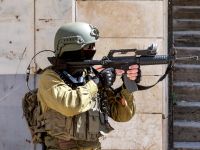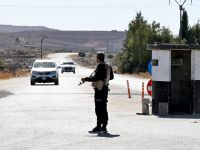Pentagon planners say it will take six months to produce enough Joint Direct Attack Munitions (JDAMs), the precision systems that guided 1,000-pound bombs to Taliban and al Qaeda targets, to contemplate an attack on Saddam Hussein's Iraq.
According to The Washington Times, Bush administration rhetoric has fueled speculation that a military move against Iraq could be imminent. But the military reality is that it could take up to a year before the United States is ready to launch a coordinated attack likely to achieve the administration's goals of destroying Iraq's weapons of mass destruction capability and replacing Hussein's regime.
According to testimony and interviews with top administration and Pentagon officials, foreign diplomats and analysts, depleted arms stocks, demands on ships and aircraft in the Afghan campaign, severe strains on active duty and reserve forces over the last five months, and the need to obtain regional basing and command center agreements have imposed an unavoidably lengthy timeline on U.S. action.
Despite its tough verbal offensive, and remaining divisions between Pentagon and State Department leaders, sources said, the White House believes that complete, unqualified success in any campaign against Iraq is far more crucial – politically, militarily and diplomatically – than the need to act rapidly in the absence of an immediate provocation.
Beyond the resource demands of the military, conditions inside Iraq and the surrounding region are still far from optimal.
In recognition of these realities, the Bush administration has developed a strategy of short- and long-term actions designed to ensure that all the elements it sees as necessary for success eventually will converge.
Many of the initial military steps are well underway, based on a working assumption that an assault would start with a massive air strike on Iraqi antiaircraft defenses and known weapons-of-mass-destruction sites, ideally guided by friendly forces on the ground. This would be followed by the entry of major units of U.S. troops, equipped to withstand chemical or biological weapons attacks.
"Our objectives in Iraq can only be met with forces on the ground," said an official inside the Pentagon with long experience on policy and planning issues. "We can't inspect [chemical weapons facilities] from the air."
Blair, Bush
British Prime Minister Tony Blair and United States President George W. Bush are scheduled to meet in April to finalize details of military action against Iraq, The Observer newspaper has reported.
The British paper said Blair would travel to the U.S. capital to give his support for action against the Iraqi President, if Saddam continued to ignore demands that he destroy his weapons of mass destruction.
"The meeting will be to finalize Phase Two of the war against terrorism," The Observer quoted a senior Downing Street official as saying on Sunday. "Action against Iraq will be at the top of the agenda."
Iraq has refused to let United Nations weapons inspectors into the country since 1998.
In the meantime, public and political opinion in Britain has started to turn against US action on Iraq.
The Observer said the British government was planning to publish evidence detailing Iraq's nuclear capabilities to quell criticism from its back-benches and to reassure the public.
The document will disclose that Saddam Hussein is attempting to amass fundamental nuclear capabilities and is also investigating a way to launch "dirty" nuclear bombs, unsophisticated devices that would nevertheless cause havoc if used, the paper expressed.
The Downing Street source told the paper that it was a "public persuasion" matter that was necessary to maintain support for military operation against Baghdad.
(Albawaba.com)
© 2002 Al Bawaba (www.albawaba.com)







